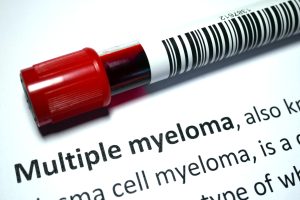
24 RCCA Physicians Named to 2025 Castle Connolly ‘Top Doctors’ List for Exceptional Cancer Care
A cancer diagnosis can be frightening. An individual may worry about how, or if, they will get better. The future becomes unclear and the strain
HIPAA Alert: Potential Data Breach Learn More
Questions on Oncology, Hematology and/or Infusion Clinical Services due to COVID-19 Crisis – CALL 833-698-1623
Important Information for Our Patients Regarding the Coronavirus.
RCCA Providing Area Cancer Patients with Access to Care During Coronavirus Outbreak
RCCA Offering Patients Virtual Visits During Coronavirus Pandemic
Research is ongoing to develop innovative treatments for cancers and blood disorders. Treating these diseases can be challenging, as they manifest differently in each patient, and because certain treatments can be less effective in later-stage cancers. A patient’s overall health and ability to tolerate some therapies also can limit treatment options.
One promising development, known as “adoptive cell therapy” or “cellular immunotherapy,” is offering new options and new hope to patients with some difficult-to-treat cancers. Immunotherapy enhances a patient’s immune system to help it attack and kill cancer cells. In cellular immunotherapy, a patient’s own cells are used to provide the immune system with this boost.

The expert medical oncologists and hematologists of Regional Cancer Care Associates (RCCA) explain adoptive cell therapy and how advances in this emerging scientific field are changing the outlook for many patients with cancer.
The immune system protects a person from illness. It does this primarily by identifying and attacking antigens, harmful microbes such as harmful substances, disease-causing bacteria and viruses.
The immune system also monitors the body for the development of cancerous cells, and seeks to kill the cancerous cells it identifies. However, cancer cells can elude detection and ultimately weaken the immune system, making it difficult for the body’s natural defenses to combat the cancer without help.
By strengthening the immune system, immunotherapy provides the body with the ability to recognize and destroy cancer cells. Multiple types of immunotherapy are available, with some of the most common being checkpoint inhibitors, monoclonal antibodies, and vaccines.
Adoptive cell therapy is another type of immunotherapy. In adoptive cell therapy, physicians collect blood from a patient in a process called leukapheresis. This process is very similar to blood donation, with a modest amount of blood taken by insertion of an intravenous (IV) needle into a vein. Immune cells in the blood, such as T cells, then undergo special treatment in a laboratory to enhance their ability to identify and fight cancer. The treated cells are then re-introduced into the patient’s body through an IV infusion. This process varies somewhat based on the type of adoptive cell therapy and the type of cancer it is treating, as described in greater detail below.
Immunotherapy has shown effectiveness in treating blood cancers such as leukemia and lymphoma, as well as in treating certain solid tumors. Based on ongoing research, adoptive cell therapy has been shown to be a viable treatment for some blood disorders and other conditions.
Doctors classify approaches to cellular immunotherapy based on how each therapy works. Some adoptive cell therapies involve increasing the number of immune cells in the body. Others employ genetic engineering to bolster immune cells’ ability to fight cancer. The most common types of adoptive cell therapy include:
The immune system encompasses billions of cells of different types that aid in its function. White blood cells, called lymphocytes, make up a significant portion of the immune system. Lymphocytes are categorized further into:
CAR T cell therapy entails changing a patient’s T cells, empowering them to attack cancer cells. The doctor draws blood and separates white blood cells before returning the altered blood to the patient. The T cells are then sent to a laboratory for genetic engineering.
In the lab, doctors introduce DNA to T cells, creating a synthetic protein called a chimeric antigen receptor (CAR) on the cell surface. CARs enable T cells to detect an antigen in tumor cells as they would with other threats to health, such as infectious viruses or bacteria. Doctors multiply engineered CAR T cells in the lab, and when there are enough T cells, they freeze them and send the frozen cells to the treatment center.
During treatment, CAR T cells re-enter the bloodstream and increase in number to identify and attack cancer cells that have the targeted antigen. Aside from eliminating cancer cells, CAR T cells may also protect against recurrence as these engineered cells often remain in the body for months after infusion.
In some patients, T cells cannot recognize cancer cells. In other cases, T cells may recognize cancerous cells but be unable to activate or multiple in sufficient numbers to attack tumors effectively. In these cases, engineered T cell receptor (TCR) therapy is often the best option.
Like other types of adoptive cell therapy, engineered TCR therapy involves collecting T cells from the patient’s body. However, instead of activating and increasing the number of existing T cells, doctors enhance these cells with new receptors for identifying and targeting the antigens of specific cancers.
Engineered TCR therapy enables doctors to determine the optimal target based on the patient’s tumor and the specific T cells that require. This process allows for more personalized treatment and may increase positive outcomes.
Natural killer cell therapy is a more recent development in cellular immunotherapy. Unlike T cells, NK cells do not have an antigen-specific T cell receptor. Instead, germline-encoded receptors control NK cells and enable them to sense their environment.
Because of this, NK cells do not require prior stimulation to attack and kill cancer cells. Additionally, results from several clinical trials indicate that NK cell therapy is well-tolerated by many patients, meaning it may be a safer alternative to T cell therapy for some people.
Early clinical studies have delivered promising findings regarding NK cell adoptive transfer for treating multiple myeloma and certain lymphomas. Advances in genetic engineering technologies and the development of CAR T cell therapies have prompted clinical interest in equipping NK cells with CARs that would further increase their ability to fight cancer.
Several factors can inhibit the ability of T cells to kill cancer cells. For T cells to destroy cancer cells, they must first be activated. Once activated, they must remain in this state long enough for the body to generate an anti-tumor response. When the immune system is weakened by cancer, this process may be impeded. Another potential hurdle is having too few T cells in the immune system to enable effective activation.
TIL therapy seeks to rectify these issues. Doctors extract and isolate naturally occurring T cells that have already interacted with cancer cells from the patient’s body. Doctors then activate these cells and expand their number. The activated T cells re-enter the body to identify and attack tumors.
Numerous clinical trials have sought to identify the most appropriate uses for different adoptive cell therapies by investigating their action on specific cell receptors. As of early 2024, cellular immunotherapies approved by the United States Food and Drug Administration (FDA) focus on two targets:
BCMA is a naturally occurring signaling receptor that helps regulate B cell growth. This antigen is often found in lymphoma or multiple myeloma cells. BCMA may cause cancer cells to grow more rapidly and live longer.
BCMA CAR T cell therapies target this antigen to destroy cancer cells. The BCMA antigen also provides a marker for monitoring response to cell therapy, allowing clinicians to measure the effectiveness of treatment.
BCMA-targeted therapies can improve survival rates for patients with multiple myeloma, because this cancer originates in B cells.
This B cell receptor plays an essential role in the development, growth, and behavior of B cells. CD19 receptors are often found in leukemia, lymphoma, and myeloma cells, making CD19-targeting cell therapies a logical choice for treating these blood cancers.
As of early 2024, other targets of adoptive cell therapies not yet FDA-approved but under evaluation in clinical trials include:
As with all cancer treatments, adoptive cell therapies may cause side effects. Specific side effects vary depending on the type of cellular immunotherapy and its target. The cancer type and its location, as well as the patient’s overall health, also play a role.
Generally, these side effects stem from the immune system becoming overactive. They are often mild or moderate but may be more serious in some cases, and may include:
Sometimes called cytokine storm, cytokine release syndrome (CRS) may develop during or following CAR T-cell therapy.
Cytokines are chemical messengers that aid the function of T cells. CRS typically occurs within about 20 days of infusion, but its timing and duration depend largely on the patient and on the intervention used to manage the side effect.
Symptoms of CRS often resemble a mild case of the flu and include fever and chills, headache, nausea, and tiredness. Most symptoms are treatable, but patients should seek treatment as soon as possible.
Severe CRS is dangerous and should be treated immediately. Signs of severe CRS include:
Neurotoxicity, another serious potential side effect of adoptive cell therapy, is defined as damage or inflammation in the brain or peripheral nervous system because of exposure to toxic substances. While most cases of neurotoxicity result from exposure to substances such as lead and mercury or chemicals in household products, some substances used in adoptive cell therapies also can be toxic to the nervous system in certain cases.
When these toxins interact with the brain and other components of the nervous system, they can disrupt how nerves function and possibly damage or destroy them. Neurotoxicity is usually reversible, with symptoms resolving on their own and without long-term effects. In some cases, however, symptoms can be life-threatening unless intervention is swift. Adoptive cell therapy patients should contact their doctor immediately if they notice any of the following symptoms of neurotoxicity:
With many clinical trials in progress and more on the horizon, further advances in adoptive cell therapy can be expected. Consider some of the following developments shaping cellular immunotherapy.
While cellular immunotherapy represents a true medical breakthrough, several obstacles continue to prevent it from reaching its full potential. In particular, there can be challenges with the engineered cells re-introduced to a patient’s body:
In seeking solutions to these challenges and working to enhance the safety of cellular immunotherapy, scientists are exploring approaches that include:
This technique involves manipulating the host and transferred immune cells, or their microenvironment, to better control their activity in the body.
Through biomaterials, doctors can boost the efficacy of immune cell therapies by:
The process of extracting immune cells and preparing them for infusion is time-consuming. This obstacle has prompted research into in situ gene modification—changing host cells in place without needing to remove them from the body.
Most immune cell therapy efforts involve ex vivo (outside-of-the-body) cell engineering. The following approaches focus on improving the primary approaches to cell modification: antigen receptor engineering, host cell genome engineering, and therapeutic payload co-engineering.
Immune cell manufacturing is another area for improvement. The standard approach for delivering the DNA required for immune cell therapies is through viral transduction, but medical researchers now are considering nonviral approaches.
One of the most significant innovations is “off-the-shelf” immune cells. Collecting T cells from the patient’s body is not always feasible because of a blood disorder, or because cancer may weaken the immune system. In these situations, the patient’s cells may be dysfunctional or otherwise changed. By contrast, “off-the-shelf” cells are supplied by healthy donors. This potential solution could not only increase the availability of adoptive cell therapy, but also could expedite the process by eliminating the time needed to separate T cells.
Although the FDA has approved several adoptive cell therapies, many more are – or soon will be – evaluated in clinical trials. Such trials are broken down into several phases, including:
Patients may be reluctant to consider clinical trials because the treatments are experimental and not FDA-approved. These treatment options, however, may provide hope and improve the prognosis if more established treatments have proven ineffective.
Patients who are apprehensive about clinical trials should know that researchers adhere to strict regulations to protect patient safety. Additionally, every patient who is considering participation in a clinical trial will take part in an “informed consent” discussion before the trial begins. During this discussion, researchers provide an overview of what will occur, including the potential benefits and the known possible risks. Patients can then decide if they wish to participate in the trial.
Also, every clinical trial is monitored by an institutional review board and other scientific professionals to ensure protocols are being followed to keep participants safe.
Clinical trials for various cancers and blood disorders provide qualifying patients with access to additional treatment options, with a trial’s sponsor typically covering most or all of the cost of treatment and related expenses.
The expert oncologists and hematologists of RCCA keep abreast of the latest advances in cancer treatment and offer patients access to cutting-edge, evidence-based therapies as well as to more than 300 clinical trials. RCCA has 22 community-based, conveniently located treatment centers throughout New Jersey, Connecticut, Maryland, and the Washington, DC area, so patients can find compassionate, comprehensive care close to home.
Contact us to learn more about treatment options for cancer and blood disorders, or schedule an appointment at one of RCCA’s nearby locations.
For more information or to schedule an appointment,
call 844-346-7222. You can also schedule an appointment by calling the RCCA location nearest you.

A cancer diagnosis can be frightening. An individual may worry about how, or if, they will get better. The future becomes unclear and the strain

Multiple myeloma (MM) is a rare type of blood cancer that often develops without early symptoms, making awareness of risk factors essential. Regional Cancer Care

A cancer diagnosis can bring a wide range of emotions, from fear and stress to sadness and hope. These feelings are a natural part of

Regional Cancer Care Associates is one of fewer than 200 medical practices in the country selected to participate in the Oncology Care Model (OCM); a recent Medicare initiative aimed at improving care coordination and access to and quality of care for Medicare beneficiaries undergoing chemotherapy treatment.